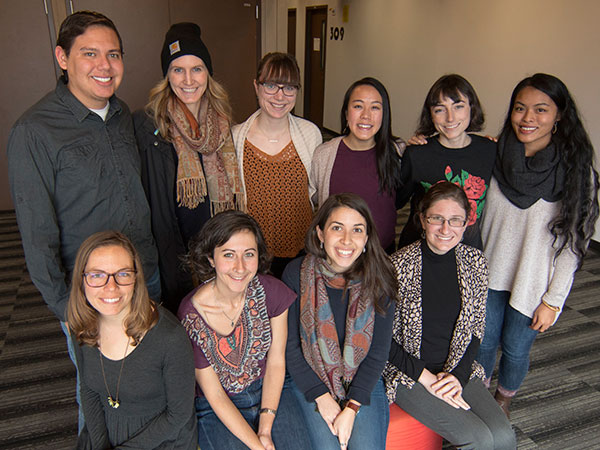A group of graduate students from the Community-Oriented Public Health Practice (COPHP) program has received the 2018 Martin Luther King Jr. Community Service Award for work to move the COPHP program toward anti-racist practice. The group, selected by the UW School of Public Health, received the award at an MLK celebration last Thursday, Jan. 18, in the Magnuson Health Sciences Center.
The students are part of the Committee on Oppression, Racism and Education, or CORE, formed by the entering COPHP class of 2013. CORE’s mission today is to “push anti-racism as a model and value for our own lives, institutions, organizations and communities.”

“An important part of our mission is recognizing that we’re on a journey,” says MPH student Casierra Cruz, originally from the island of Guam. “Undoing institutionalized racism won’t happen tomorrow or by the end of our two years in the program, but with CORE, the work never stops. The work is passed on and each CORE graduate continues this work beyond the School of Public Health and into their jobs and communities.”
CORE has continued to deepen its work over the years, building on the foundation that students before them started. CORE students and COPHP faculty have added an anti-racism commitment statement to course syllabi and incorporated classroom climate questions into student evaluations. CORE students take part in regular faculty meetings and help review program cases for implicit bias.
“Racism causes bad health,” says MPH student Jessica Mogk, who joined CORE in 2016. “As public health practitioners and researchers we need to recognize that and to actively combat it and call it out in our classrooms and discussions.”
For a COPHP faculty retreat, CORE students created an exercise that illustrated how micro-aggressions play out in the classroom and helped faculty to work through the best ways to manage the situations. CORE students also plan and participate in their own trainings using facilitation skills they’re building in the COPHP program.
Mogk, originally from Arizona, joined CORE because it was a safe space to meet classmates and to have important conversations about racism and micro-aggressions, both in and out of the classroom. “It was a place to learn from others and to make myself better, to work on my own internal racialized superiority, so I’m not hurting my classmates and friends of color,” she says.
Cruz, who moved to Seattle from Micronesia two years ago, echoed a similar sentiment. “Being categorized as a person of color was new to me,” she says. “It took me a while to realize it and once I did, I needed a safe space to re-center my thoughts and to better my relationships with my peers.”
Because of CORE’s work, students staged their first two-day Undoing Institutional Racism workshop in 2014, sponsored by the People’s Institute Northwest. The workshop helps participants understand the history and purposes of racism, connections between racism and poverty, and how power dynamics in our institutions perpetuate racism.
For the next two years, every first-year COPHP student was required to take part in the weekend-long training. Now, the workshops – managed by COPHP alum Omid Bagheri, a clinical instructor in health services – are open to all students, staff and faculty of the School of Public Health.
The MLK awards are presented to an individual or group from each of the six UW Health Sciences schools in honor Dr. King’s commitment to addressing community needs, development of programs to improve the human condition, and significant efforts to protect and empower all individuals.
The MLK tribute will be held on Thursday, Jan. 18, from 11:30 a.m. to 1:15 p.m. in the lobby of the Magnuson Health Sciences Center. The awards are usually given out around 12:45 p.m.
